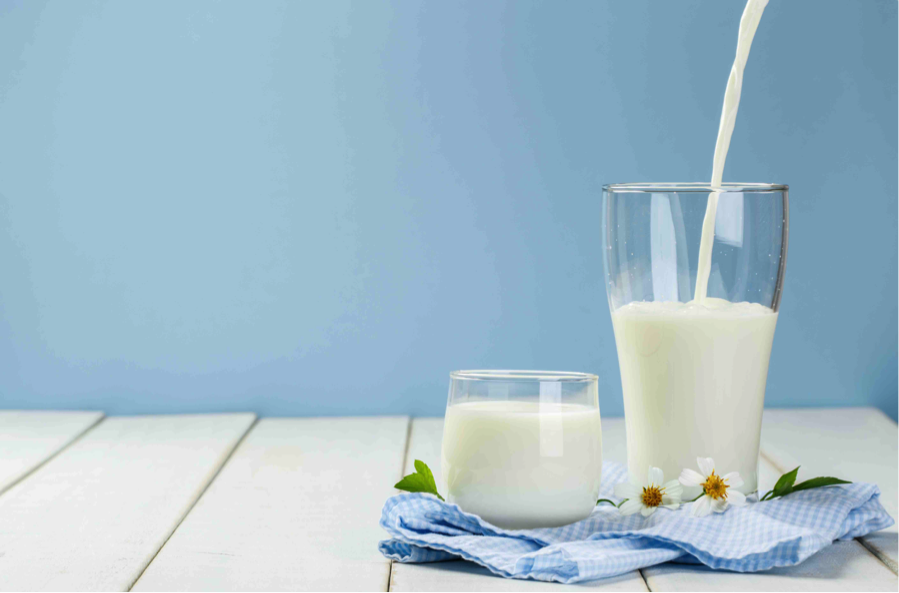
It’s unique combination of carbohydrate, fat and protein makes it the best nutritional drink to have.
1st June, 2019

Milk has been getting a bad rep for quite a few years now, with the term ‘lactose intolerant’ becoming quite the popular term these days. Fact is, from time immemorial, human beings (irrespective of which age-group they fall in) have been drinking milk, without any issues, as it is the most nutritionally complete food, consisting of water, fats, sugars, proteins, vitamins and minerals.
Milk is a great nutrient package of 9 essential vitamins and minerals, including calcium, vitamins A, D and B12, protein, potassium, riboflavin, niacin (includes niacin equivalent) and phosphorus. It is the only food that has the unique combination of carbohydrate, fat and protein, making it the ideal ‘meal in a glass.
Despite the fact that milk is submitted to pasteurization, sterilization and other thermal treatments increase its shelf life, its fats, liposoluble vitamins, carbohydrates and minerals are not affected.
| Values per | PROTEIN | FAT | CARBOHYDRATE | CALORIES | CALCIUM |
| 100 ml | gm | gm | gm | Kcal | mg |
| Buffalo milk | 4.3 | 6.5 | 5.0 | 117 | 210 |
| Cows milk | 3.2 | 4.1 | 4.4 | 67 | 120 |
| Skimmed milk | 3.1 | 0.1 | 4.4 | 33 | 120 |
Some kinds of milk contain more fats than others, so if you are trying to watch your weight, try fat free or low fat. It’s important to have around three glasses of milk a day to get the right quantity of vitamins and minerals your body requires. Concentrate on trimming fat, not nutrients. The American Heart Association endorses fat free and low fat milk to reduce fat in your diet as you still get your daily dose of necessary nutrients.
Learn how including milk in your daily diet can put you on the road to good health…
-
Strengthens Bones, Promotes Healthy Weight.
Milk not only helps build bone mass and maintains bone density, but recent studies have also shown that teenagers who drink milk tend to be leaner than those who don’t.
-
Maintains Lean Body Mass.
The protein in milk contains all of the essential amino acids for building or maintaining your lean body mass. Three glasses of milk provides about half the protein you need each day.
-
The Ultimate Sports Recovery Drink.
When it comes to refueling after exercise, new research suggests chocolate milk can be just as effective, if not more, than traditional sports drinks. Researchers found it helps athletes recover from an intense workout and is an effective exercise recovery drink to refuel exhausted muscles, allowing for future enhanced performance.
-
Provides Essential Electrolytes.
Potassium is crucial to regulate the balance of fluids in the body and is also needed for muscle activity and contractions.
-
Gets You Energized.
Milk contains B-vitamins such as B-12, niacin and riboflavin, which are necessary to convert food to energy for exercising muscles. One glass of milk also provides 20 percent of the phosphorus you need each day, which helps strengthen bones and generates energy in your body’s cells.
-
Keeps You Hydrated.
Milk is 90 percent water so it can help provide fluid to keep you hydrated.
Recently, while researching for a talk conducted by SelfCare’s Founder Mrs. Suman Agarwal, we found that people who consumed 200ml or less of milk or milk products most often suffered from back pain, hair fall, low energy levels, acidity, muscular weakness, osteoporosis, etc. Doubts on the benefits of milk,based more on anecdotal information rather than sound, peer-reviewed scientific research, has created much confusion.
We decode the common misconceptions…
1. Allergy to cow’s milk is common in young children:
FACT: Only two to three per cent of the population is truly allergic to milk. This is mainly a condition in infancy, and around nine out of ten of those affected grow out of it by the age of three. It is unwise to exclude dairy products from the diet without specialized advice from a dietician.
2. Drinking milk causes excess mucus production:
FACT: It has been suggested that milk and dairy products increase mucus production, and that avoiding milk will therefore alleviate the respiratory symptoms associated with colds. However, there is no good scientific evidence to support this. Milk does tend to leave a slightly filmy coating in the mouth or throat, but this is the result of milk’s texture and perhaps a little saliva production but not mucus.
3. Lactose intolerance is widespread:
FACT: For some people, consumption of milk may cause gas, bloating, cramps and diarrhea. These symptoms are hallmark of lactose intolerance (an inability to digest the milk sugar, lactose, properly) but this does not mean that you should avoid all dairy products. Milk can be consumed in other forms like curd, paneer etc. as these are more digestible forms to get all its benefits. The gradual reintroduction of dairy products in progressively greater quantities tends to improve your ability to tolerate lactose.
4. The protein in milk (animal protein) is not good for you:
FACT: The protein in milk is very good for you, as it is a high quality animal protein. The protein from animal sources, e.g. milk, eggs and meat, provides all the indispensable amino acids that we cannot make ourselves. Some studies have also shown that it may help protect against cancer. The fact remains that for vegetarians milk forms a major source of protein and calcium, and is the only source of vitamin B12. They should be very careful in procuring protein, B12 and calcium in their diet if they decide to go off milk or milk products.


